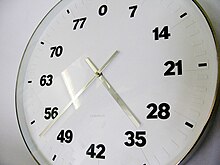Life clock: Difference between revisions
Appearance
Content deleted Content added
m Reverted edits by Materialscientist (talk) to last version by Apisero |
|||
| Line 8: | Line 8: | ||
==Origin== |
==Origin== |
||
The life clock was originally made by Bertrand Planes in 2004. The premise of the slowed-down mechanism was based on the average lifespan of Europeans, 84 years. The life clock was first shown at "Maison: Temoins", [[Paris]] in 2004. |
|||
==External links== |
==External links== |
||
* {{in lang|en}} [http://www.bertrandplanes.com/lifeclock/?frame=menu&dir=./2006_LifeClock_2 ''Life Clock Page''] |
* {{in lang|en}} [http://www.bertrandplanes.com/lifeclock/?frame=menu&dir=./2006_LifeClock_2 ''Life Clock Page''] |
||
Revision as of 13:10, 18 September 2020
This article has multiple issues. Please help improve it or discuss these issues on the talk page. (Learn how and when to remove these messages)
|

Life Clock is a concept by Bertrand Planes that is marked in sevens up to eighty four, with a mechanism slowed down 61,320 times. Each number represents a year, and a full rotation is made each 84 years (12x7=84). This was the maximum average lifespan in Europe in 2006. The numbers on a Life clock are 7, 14, 21, 28, 35, 42, 49, 56, 63, 70, 77, 0.
Origin
The life clock was originally made by Bertrand Planes in 2004. The premise of the slowed-down mechanism was based on the average lifespan of Europeans, 84 years. The life clock was first shown at "Maison: Temoins", Paris in 2004.
External links
- (in English) Life Clock Page
- (in English) Life Clock on Internet
